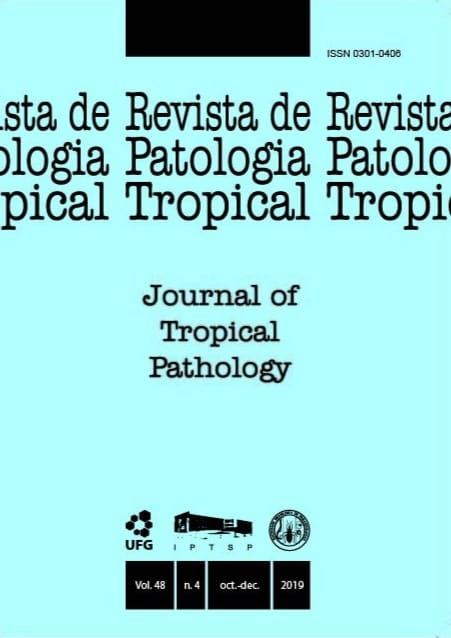Toxoplasma gondii AND OTHER PARASITES STUDIED IN FELINE FECES IN ZOOS IN CUBA AND BRAZIL
DOI:
https://doi.org/10.5216/rpt.v48i4.62139Resumo
Under certain circumstances, wild animals kept in zoos may be more exposed to infectious parasitic diseases. The puprpose of this study was to determine the frequency of gastrointestinal parasites in captive wild felids in the National Zoological Park (PZN) in Cuba (Havana) and in RioZoo in Brazil (Rio de Janeiro). A total of 52 fecal samples were collected from 52 felids, as follows: 19 Panthera leo, two Leopardus tigrinus, two Leopardus pardalis, one Panthera tigris altaica, four Panthera tigris tigris, six Panthera onca, seven Puma concolor, one Herpailurus yagouaroundi, three Acinonyx jubatus, two Caracal caracal and five Panthera pardus. The fecal samples were processed and examined microscopically. The frequency of parasite positive animals was 17.5% (7/40) in PZN and 25% (3/12) in RioZoo. Panthera pardus (40%) and Panthera onca (20%) were most frequently infected in PZN and Panthera leo (100%) and Leopardus pardalis (50%) in RioZoo. Hookworm (12.5%) was detected in PZN as well as Toxascaris leonina (10%) and in RioZoo nematode larvae (9.1%) , hookworm eggs (9.1%), Toxascaris leonina (2%) and the cestode eggs from the Diphyllobothriidae family (9.1%) were found. Toxoplasma gondii-like oocysts were not detected in feline feces. Although the positivity of gastrointestinal parasites detected in feline fecal samples was not very high in these zoos, both institutions need to implement and maintain sanitary measures, including routine diagnosis of parasitosis followed by specific treatment according to the infections detected.
KEY WORDS: Captive wild felids; gastrointestinal parasites; National Zoo Park of Cuba; Rio de Janeiro Zoo; Brazil.
Downloads
Downloads
Publicado
Como Citar
Edição
Seção
Licença
The manuscript submission must be accompanied by a letter signed by all authors stating their full name and email address, confirming that the manuscript or part of it has not been published or is under consideration for publication elsewhere, and agreeing to transfer copyright in all media and formats for Journal of Tropical Pathology.

